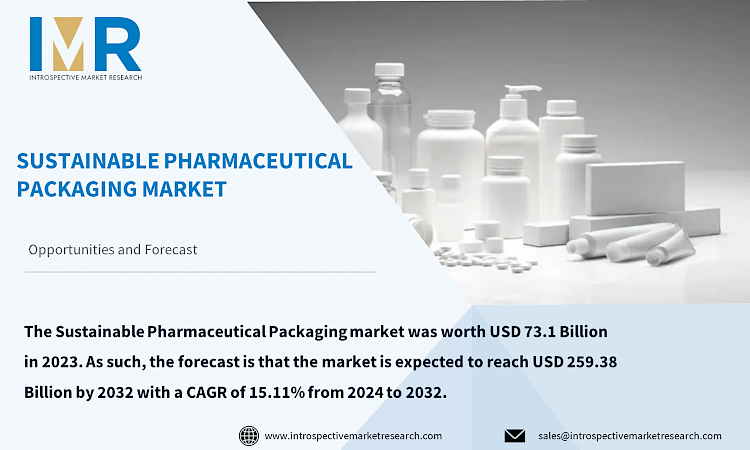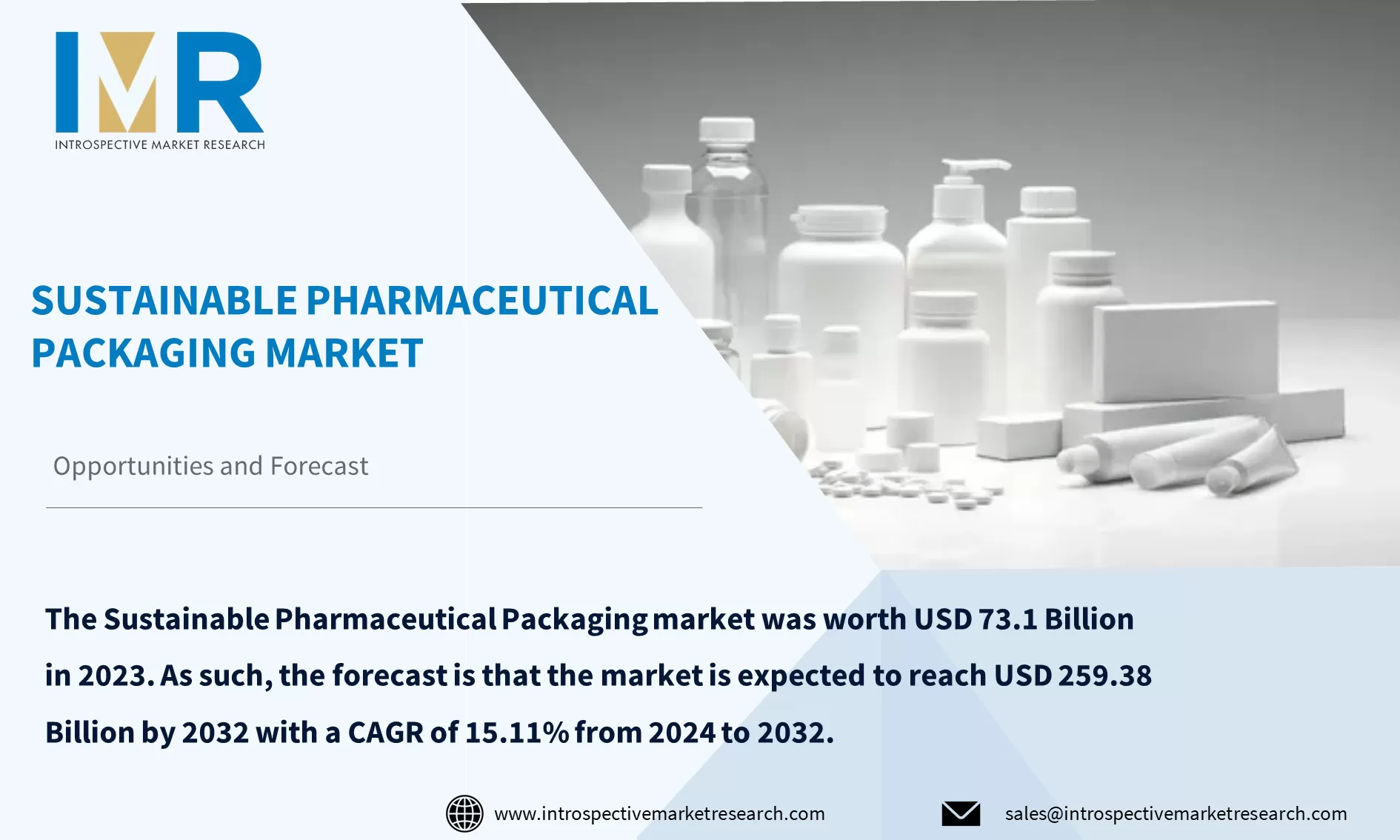
According to a new report published by Introspective Market Research, titled, ?Sustainable Pharmaceutical Packaging Market by Material Type, End-Use Application, and Packaging Type: Opportunity Analysis and Industry Forecast, 2024?2032.
The Sustainable Pharmaceutical Packaging market was worth USD 73.1 Billion in 2023. As such, the forecast is that the market is expected to reach USD 259.38 Billion by 2032 with a CAGR of 15.11% from 2024 to 2032.
The sustainable pharmaceutical packaging market is experiencing rapid growth driven by increasing environmental concerns, regulatory pressures, and consumer demand for eco-friendly solutions. Pharmaceutical companies seek packaging alternatives that minimize environmental impact while maintaining product integrity and safety.
Several key trends are shaping the sustainable pharmaceutical packaging market, there's a growing emphasis on reducing plastic usage and increasing the use of recyclable, biodegradable, and compostable materials. This includes innovations such as plant-based plastics, paper-based packaging, and biodegradable polymers.
Furthermore, advancements in packaging design and technology are enabling manufacturers to create packaging solutions that are lighter, more compact, and require fewer resources to produce. This not only reduces material waste but also lowers transportation costs and carbon emissions throughout the supply chain.
Regulatory bodies worldwide are implementing stricter guidelines and mandates to promote sustainable packaging practices within the pharmaceutical industry. This includes requirements for eco-friendly materials, recyclability, and lifecycle assessments. Compliance with these regulations is becoming increasingly important for pharmaceutical companies to maintain market access and meet consumer expectations.
Moreover, consumer awareness and preferences are driving demand for sustainable packaging options. Patients are increasingly concerned about the environmental impact of the products they use, including pharmaceuticals, and are actively seeking out brands that demonstrate a commitment to sustainability.
Patients and healthcare providers are becoming more conscious of the environmental impact of pharmaceutical products, including their packaging. Pharmaceutical companies that embrace sustainable packaging can enhance their brand image, attract environmentally conscious consumers, and build long-term loyalty. This shift in consumer preferences is driving pharmaceutical companies to invest in eco-friendly packaging materials and practices to stay competitive in the market.
Rapidly growing awareness of environmental concerns has been a driving force behind the expansion of this market. Consumers and regulatory bodies are increasingly demanding eco-friendly alternatives in pharmaceutical packaging, prompting pharmaceutical companies to re-evaluate their packaging strategies. Furthermore, sustainability in pharmaceutical packaging not only aligns with corporate social responsibility goals but also presents opportunities for cost reduction through improved supply chain efficiency and reduced waste disposal costs. The industry is witnessing a shift towards sustainable practices and a growing demand for environmentally responsible packaging solutions.
Sustainable Pharmaceutical Packaging Market, Segmentation
The Sustainable Pharmaceutical Packaging market is segmented based on Material Type, End-Use Application, and Packaging Type
Material Type:
The sustainable pharmaceutical packaging, the biodegradable plastics segment is projected to reign supreme in terms of material type. This dominance stems from the growing emphasis on eco-friendly solutions within the pharmaceutical industry. Biodegradable plastics offer a compelling alternative, aligning with the industry's sustainability goals while ensuring effective packaging solutions for pharmaceutical products. Factors such as increased environmental awareness, regulatory pressures, and consumer demand for greener practices contribute to the anticipated dominance of biodegradable plastics in the sustainable pharmaceutical packaging market, heralding a shift towards more eco-conscious packaging solutions.
End-Use Application:
The Sustainable Pharmaceutical Packaging Market is poised for dominance by Over-The-Counter (OTC) Medications in terms of End-Use Application. As consumer demand for eco-friendly solutions grows, sustainable packaging options for OTC medications are gaining traction. With increasing awareness of environmental concerns, pharmaceutical companies are prioritizing packaging that minimizes waste and reduces carbon footprint. This trend aligns with consumer preferences for environmentally responsible products, driving the prominence of sustainable packaging solutions in the OTC medication segment. As a result, the OTC sector is anticipated to lead the sustainable pharmaceutical packaging market, reflecting the industry's commitment to both health and environmental sustainability.
Region:
Asia Pacific is known for its cost-effective manufacturing capabilities, making it an attractive region for pharmaceutical companies looking to reduce production costs. Sustainable packaging materials and technologies have become more accessible and affordable in the region due to advancements in manufacturing processes and economies of scale. This cost-effectiveness has incentivized pharmaceutical companies to adopt sustainable packaging solutions, as they seek to balance environmental responsibility with cost savings.
Some of The Leading/Active Market Players Are-
- AptarGroup
- SGD Pharma
- Cormack Packaging
- Westrock
- K?rber Medipak Systems
- Billerudkorsn?s
- Sanner Gmbh
- Bilcare Limited
- Constantia Flexibles
- Bemis Company Inc.
- Comar, Other Active players
Key Industry Developments: -
- In January 2023, Amcor, a leading packaging company, announced its commitment to achieving net-zero greenhouse gas emissions by 2050. This includes plans to invest in recycled and renewable materials for its pharmaceutical packaging solutions.
- In February 2023, Sonoco acquired PMC Global, a leading manufacturer of paper-based pharmaceutical packaging solutions. This acquisition strengthens Sonoco's position in the sustainable packaging market and expands its product portfolio.
- In February 2023, Merck done partnership with Alpla, an Austrian plastic packaging giant, to develop and implement sustainable packaging solutions for its pharmaceutical products. This partnership focuses on reducing plastic waste and increasing the use of recycled materials
Key Findings of the Study
- Biodegradable plastics to dominate the sustainable pharmaceutical packaging market. This trend is driven by a concerted effort within the pharmaceutical industry to adopt eco-friendly solutions. Biodegradable plastics offer a viable alternative, meeting sustainability goals while ensuring effective packaging solutions for pharmaceutical products. Factors such as heightened environmental awareness, regulatory pressures, and consumer demand for greener practices contribute to this dominance.
- Over-the-counter (OTC) medications as the leading segment in terms of end-use application. As consumer demand for eco-friendly solutions grows, sustainable packaging options for OTC medications gain traction. Pharmaceutical companies, responding to increasing environmental concerns, prioritize packaging that minimizes waste and reduces carbon footprint. This alignment with consumer preferences for environmentally responsible products propels the prominence of sustainable packaging solutions in the OTC medication segment, positioning it to lead the sustainable pharmaceutical packaging market.





